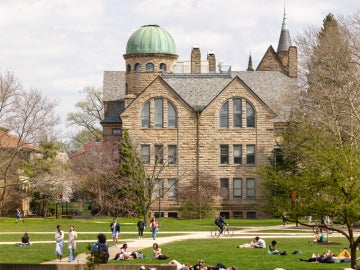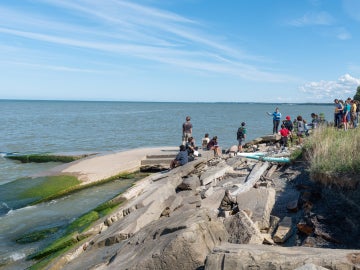A Conversation with Rachel Eveleth, Assistant Professor of Geology
June 19, 2019
Communications Staff

Rachel Eveleth, assistant professor of geology.
Photo credit: Tanya Rosen-Jones ’97
Assistant Professor of Geology Rachel Eveleth on keeping one foot in the ocean and the other in the Great Lakes.
When did you begin teaching at Oberlin?
Fall 2018
What are your current research interests?
I’m interested in interactions between climate and large bodies of water—for example, how efficiently do phytoplankton in the Southern Ocean take carbon out of the atmosphere, how does oxygen vary in Lake Erie now, and how might that change in a warmer world. I use observational data, models, and satellite data to help answer these questions. I think a lot about the role of ice in controlling biogeochemical processes, and I’m excited to start winter work on the Great Lakes next winter term! Going forward I plan to keep one foot in the ocean and the other in the Great Lakes.
In Fall 2018, you taught a course called Great Lakes Limnology. Could you give a general overview of what this course was all about?
I had so much fun teaching that course! We researched the geologic history of the Great Lakes region and explored the story preserved in local field sites. We then dove into the primary literature to think about how the rocks and landscape influence the physical, chemical, and biological systems in the Great Lakes and how humans are impacting those systems. Students developed and carried out small group research projects using publicly available data and computer programming language Python to investigate open questions on the lakes. One highlight was a field trip out to Stone Lab on South Bass Island, where students got to take measurements on an afternoon research cruise in Lake Erie. There were primarily geology majors and minors in the course.
What other courses do you teach?
I also teach Earth’s Environments (Geology 120) every year, which covers the whole earth system from plate tectonics to climate change. I will be teaching Oceanography in Spring 2020 and am excited to incorporate investigations of real-world data.
What inspired you to pursue geology (or the sciences in general)?
I grew up in western Michigan and loved watching storms roll in over the lake. I was interested in meteorology and climate, but I wasn’t exactly sure what I wanted to do with that. I applied to many colleges that specialized in meteorology but ended up falling in love with the liberal arts environment. I went to undergrad at Bowdoin College and quickly found the Earth and Oceanographic Science (then Geology) department, where I got to explore the coast of Maine in lab courses and learn how the whole earth system is interconnected. Before college, I had no idea that I could study climate by studying rocks and the ocean. I did hard rock geology research as an undergrad. I went into oceanography because it felt more dynamic to me on shorter time and space scales while also being interconnected across the whole planet. It has been so fun to reconnect with my geology roots at Oberlin, and I hope to bring a broader earth system perspective to the department and the courses I teach. I find geoscience really exciting because it is a direct application of all the other sciences (biology, chemistry, physics, etc.) to solve pressing environmental problems.
What are some interesting developments in your field that most people aren’t aware of?
We are learning more and more about ecosystem changes, human influences, and climate interactions with water bodies every day. Science really is incremental, and the oceans in particular are under explored. The way we do our science is changing as we move to more autonomous platforms like buoys (stationary monitoring over a long time), underwater drones (loaded with sensors and driven around to take measurements), and floats (move with currents making measurements as they go). Oceanographers are becoming big data scientists looking from microscopic to global scales, which is a very exciting time for students coming up in the field.
You may also like…
Oberlin Launches Critical AI Studies Minor in Fall 2026
With a solid foundation in both science and the humanities, this minor ensures students to understand and be able to analyze the ethical, cultural, environmental, political, economic, technological, and labor effects of AI.
Research Roundup
Every day, Oberlin’s faculty and students produce scholarly work that uncovers new insights into how we understand the world, particularly in the areas of sustainability and the environment.
Longman Professor Emeritus of English and Creative Writing David Young Dies at 88
Longman Professor Emeritus of English and Creative Writing David Young died on Saturday, May 3. He was 88. An esteemed poet, translator, editor, and scholar, Young taught at Oberlin between 1961 and...


